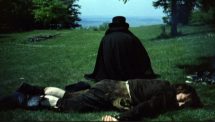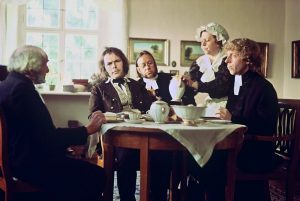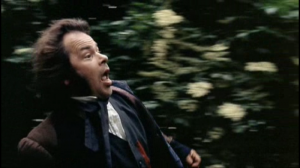The Enigma of Kaspar Hauser

(Directed by Werner Herzog) (1974)
[He did exist: and his back story, true identity, and untimely end remain a mystery. Various suppositions and theories have all been unmasked as absurd. Be that as it may, the myths around Kaspar offer a useful trope for film-makers. And in the case of Werner Herzog, it inspired his best film (along with Aguirre, The Wrath of God and Fitzcarraldo). The Enigma of Kaspar Hauser features all of his most infuriating flourishes, yet it manages to move and fascinate. Its a kind of Pygmalion-meets-The Wild Child-and-Bad Boy Bubby, with a dash of Ruprecht-the-Monkey-Boy from Dirty Rotten Scoundrels.]It opens with Kaspar, an adult with arrested development, chained in a stable, fed on bread and water, and playing with a wooden horse. This in itself is ludicrous: he would be in pretty poor shape if this was his diet for any extended time. Eventually his anonymous ‘carer’ teaches him to walk and speak the odd word: he is sent packing to Nuremberg with a letter of introduction (Herzog insists on a ponderous reading and transcription), comprising two historically real (but fake) notes: “He was brought to me October 7th, 1812. I am but a poor laborer with children of my own to rear. I beg you to keep him until he is seventeen. He was born on April 30th, 1812. I am a poor girl; I can’t take care of him. His father is dead.”
As in all foundling stories, our lad is taken in and given a good classical liberal education, featuring a hefty dose of Christian dogma, which sits ill with the young philosopher, more naturally inclined to a Rousseauian world-view (the film paints him as a sort of seer, a home-made logician, the town anchorite, a Steppenwolf in opposition to and an indictment of bourgeois society).
Eventually he acquires a place in village society; he is even feted by the great and good (and the very peculiar Lord Stanhope). But essentially he remains a rough and unready outsider; strange, stubborn, and gruff: freed from his cage, he dreams only of its bars (and similar prisons: the pilgrims struggling up the mountain, the blind man leading a caravan out of or further into the wilderness, the stork snaffling a frog). His end comes almost as a relief, to him, the villagers, and the viewer. But along the way, apart from the deliberately stark and disjointed manner in which Herzog unfolds the mysterious events, one is captivated by the director’s most audacious touch: the casting of a gadabout orphan street performer with mental issues, known only as Bruno S. Herzog copped flak for this – it was considered exploitative – but Bruno’s role is to be incongruous and this he does magnificently, with a vast, grotesque and completely authentic collection of ticks, shrugs, blurted bon mots, crazy sideways glances and catatonic, faux, brown studies. His performance supplies the revelation that the unresolved life of Kaspar Hauser lacks.
Leave a comment...
While your email address is required to post a comment, it will NOT be published.




0 Comments